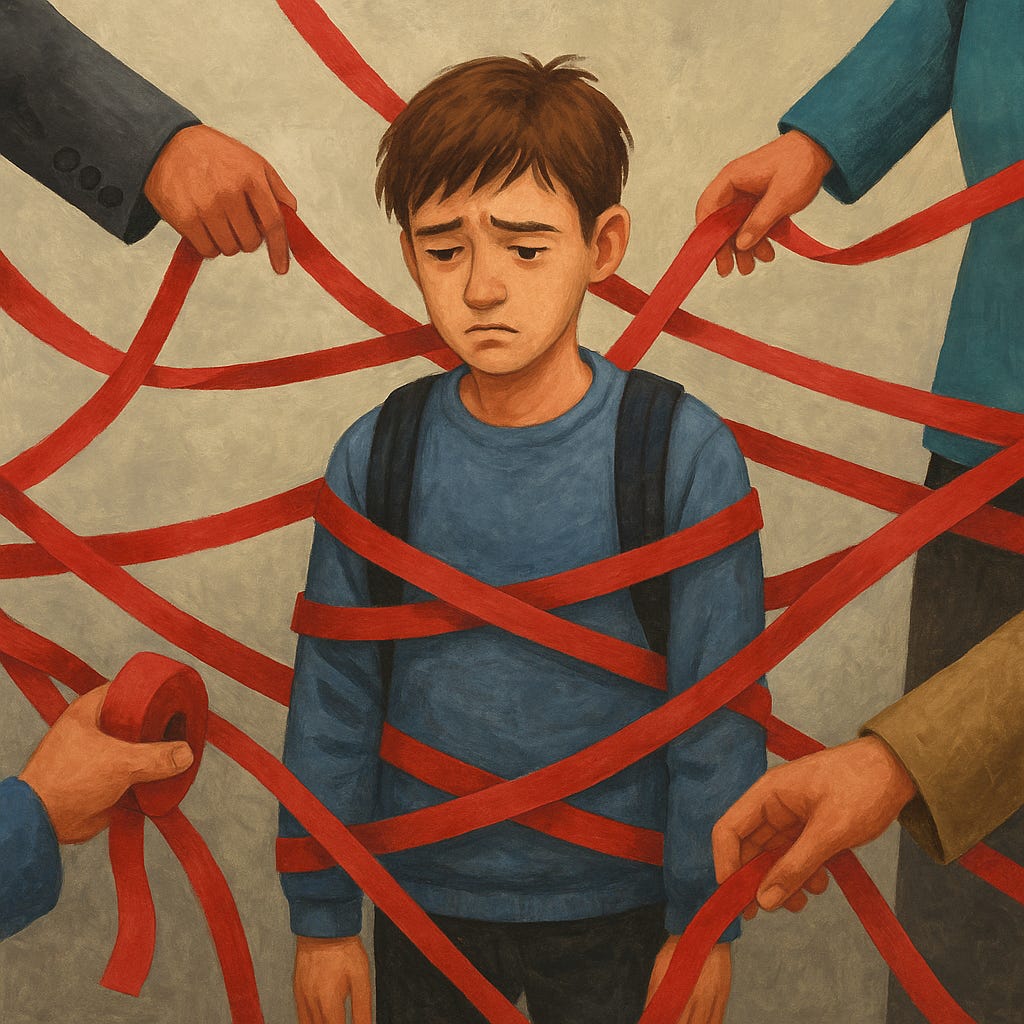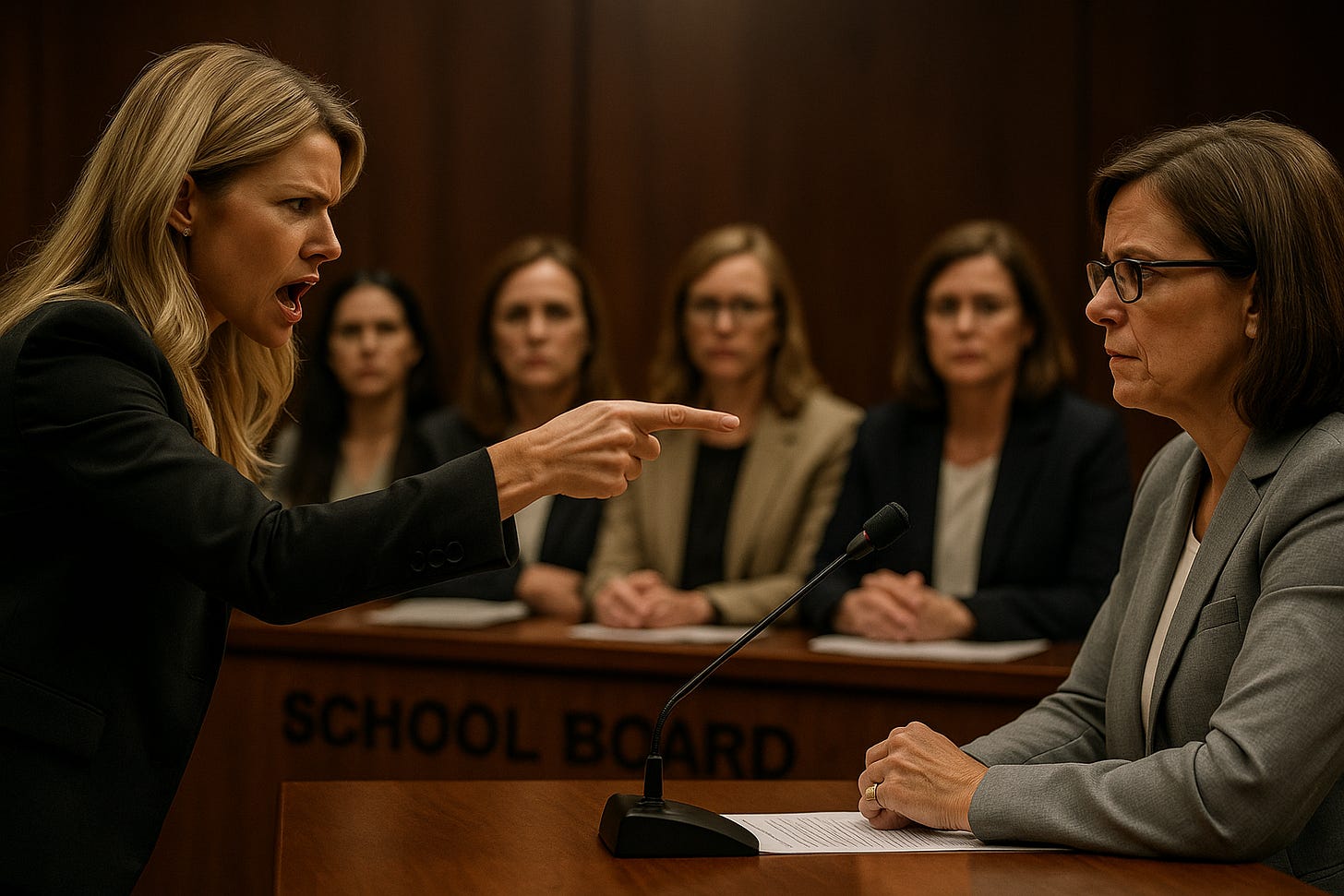The Dragon, the Viper, and the Hearing They Didn't See Coming
When the System Chose Punishment Over Progress — and Got Burned Instead
Act I: The Mistake They Wanted to Weaponize
They didn’t see it coming. Not the school. Not the district. Not the polished panel of polite nodders who had already prepped themselves for another rubber-stamp expulsion hearing.
And certainly not the principal — the one who had made this hearing personal. The one with a vendetta against free-thinkers, against those who didn’t just comply, who asked questions, who didn’t fit neatly into the box. She thought this would be textbook. A clean extraction. A kid erased from the system with a single signature.
They assumed this would be like all the others. A kid made a mistake. The paperwork says "expel." And everyone goes home before lunch.
But not this time.
This time, the family they targeted wasn’t status quo. This time, they picked a fight with a fire-breathing dragon.
The boy wasn’t a criminal. He didn’t hurt anyone. There were no drugs, no weapons. Just a dumb, impulsive decision made with a few other impressionable boys who thought they were being funny and got swept up in the moment. It happened after hours, in a school setting, with a water bottle and a whole lot of adolescent stupidity. But what made it worse—what turned it from a teachable moment into a trauma—was the kind of fear that takes root when adult authority is used not as a guide, but as a weapon. That fear—of being cornered, accused, and punished without room for context—can do more lasting damage than the mistake itself.
There was no violence. No property was truly damaged. Just a mess. A mop. Maybe a hurt ego or two.
But the system didn’t see a teachable moment. It saw a file. A code to reference, red-tape. An opportunity to purge a perceived problem.
So they moved to expel.
Act II: Enter the Dragon
They underestimated the family.
The father had been here before. Years earlier, his daughter had been failed by this same system. Poor communication. Disregarded educational needs. A maze of red tape. They fought that fight on principle, and they won.
He remembered. He never forgot.
So when it came for his son, he didn’t fold. He did what dragons do: scorched the earth for truth. He dove into legal codes, made phone calls, filed Freedom of Information requests, and stared down administrators who thought silence was strategy.
And the first move from the system? Paperwork. A stack of documents laced with inaccuracies, inflated claims, and legalese dressed up as compassion. Worse, they were asked to sign. Sign off on guilt. Sign off on language that declared the child a continuing danger. Sign off on statements that prior interventions had failed—when none had ever been attempted. Sign off on a version of the truth that would make things easier for the district, and catastrophic for the child.
Would you sign a document like that?
To make matters even more frustrating, the father’s simple request for a continuance—just to gather facts and ensure proper legal representation—was nearly derailed by the boy’s own mother. She hadn’t read the materials. She hadn’t reviewed the evidence. She showed no interest in working with the attorney or contributing to the legal costs. Yet she still moved to block the very delay that could protect their son from a lasting mark on his record. For the Dragon, it was another exhausting round of games and indifference—at a time when unity and clarity were needed most.
Even then, he didn’t rage. He refocused. He pressed forward. He kept the hearing on track and the momentum on their side.
Because this wasn’t about control. It was about protecting a kid from being consumed by a machine designed for easy exits, not just outcomes.
Act III: The Strike Team
The dragon and his son sat waiting, the tension in the air sharpened by what they had just witnessed. They had been present for the hearing before theirs — another family caught in the same web. And what unfolded in that room left them both awestruck and emboldened.
It wasn’t just a legal defense; it was a full-throttle takedown. A unified strike. The mother of the other boy had joined forces with the dragon, combining notes, facts, contradictions, and evidence into one streamlined strategy. Their shared attorney moved with exacting precision, dismantling excuses, exposing incompetence, and pulling back the curtain on the district’s house of cards. It was uncomfortable. It was unrelenting. It was artful.
They weren’t the only ones squirming. The principal, who had walked in with bureaucratic confidence, had been reduced to a stream of “I don’t knows,” “I wasn’t prepared,” and nervous glances toward the district attorney. The panel — a trio of women tasked with reviewing the facts — looked increasingly rattled. Two of them showed clear empathy, trying to maintain objectivity. But the third, noticeably stern and seemingly aligned with the principal who brought this all forward, sat stiff and unsmiling. Even she, though, couldn’t mask the discomfort in the room as the district’s narrative began to unravel. The atmosphere had shifted. The air, once thick with formality, now crackled with the electricity of exposed truth.
Act IV: The Showdown
And now, it was the dragon’s turn.
The district entered the room once again — same packets, same posture — bringing vague accusations, inflated repair invoices, and a presentation stitched together with assumptions. But this time, the energy was different. The panelists had just watched the same principal unravel in the previous hearing. They weren’t fresh anymore — they were cautious, attuned.
The facilitator, who once opened the session with charm and polished confidence, now looked weary. His tone had shifted. His patience, once smooth, had frayed into clipped phrases and narrowed eyes. What once felt like a performance now felt like cleanup — and the district was losing control of the narrative.
But this wasn’t just a rerun — it was Round Two of a coordinated strike. The attorney didn’t need a reintroduction. She was already in rhythm. How I imagine It should have introduced as:
Good morning, Principal, she said, her voice cool and deliberate. I don’t believe I need a reintroduction. But for the sake of this new case — consider me the snake that bit you before… and I still have venom to spare.
The work had been done. The trap was set. And the district didn’t realize it was walking into the second half of its own undoing.
Act V: Dissection
The Attorney:
Let’s move to your April 7 letter recommending an extension of the suspension...Principal:
Given the incident was widely known among students on social media, bringing the boys back could cause chaos and disrupt the school day.The Attorney:
Did you see that post?Principal:
Yes, I did.The Attorney:
Did you present that post as evidence in this proceeding?Principal:
No. It was from a different proceeding, and I didn’t save it.The Attorney:
So you don’t know how many students actually saw it? It could have been two, or twenty?Principal:
I’ve been a principal for 15 years — when these things happen, they cause chaos.The Attorney:
But your expulsion rationale was based on 'danger to persons' — not potential social media chaos. Did any students threaten the boy?Principal:
No, not that I’m aware of.The Attorney:
So you’re not citing a threat of violence. You're saying you believe there could be gossip. That’s not a safety threat. That’s a popularity contest.District Attorney:
Let’s not characterize—The Attorney:
I’m characterizing the legal basis for a suspension extension. And you can’t suspend a student because other kids might talk about him. That’s not in the Ed Code.Facilitator:
Let’s allow her to finish.The Attorney:
Thank you. Now — did you ever consider restorative justice, behavior contracts, or even an intra-district transfer instead of expulsion?Principal:
I did not consider other means of correction. I determined they weren’t feasible.
The heat was building. After several rounds of evasive, circular responses from the principal, the attorney leaned forward and said firmly, "This is a yes or no question." Before the principal could even fumble her way into another deflection, the district attorney snapped, "She’s already answered the question." From the audience, a family friend couldn’t help themselves and blurted, "No, she didn’t." The facilitator, clearly irritated, looked up and said sharply, "You cannot speak out of turn." But the damage was done. The panel heard it. The moment hung in the air — raw, unscripted, and undeniably honest.
The Attorney:
So you’re saying: No restorative justice. No behavior contract. No attempt at redirection. Just straight to expulsion — for a kid with no prior behavioral violations, no violence, and no threat to others?Principal:
Correct.
She folded under pressure. Her contradictions piled up like wreckage. And the viper just kept coming.
This wasn’t chaos. It was precision. It was forensic. It was season finale-level exposure.
Act VI: The Mic Drop
The room was filled with a pungent narrative — a stale loop of protocol and assumption — until the attorney stepped forward with her sharpest statement yet. The venom, precise and final, cut through the air:
The boy does not deserve expulsion.
You don’t have the required findings. There’s no threat. No repeated failed interventions. No due process. What you do have is a child who made a mistake — and a system more focused on punishment than progress.
You’ve heard from his parents, his teachers, his peers. You’ve seen the contradictions in the district’s own documents. And you’ve watched a principal fold — twice — under basic scrutiny.
So if you choose to expel this student, understand this: you’re not following the law. You’re abandoning it.
This is the only school district in fifteen years was not willing to meet with me and talk about alternatives to expulsion, and probably why the fathers research on the expulsion rate in your district is 3x higher than any surrounding county.
We're asking that you do the right thing. The boy is not a threat. His behavior was bad. He has been punished. Allow him to continue with a fresh state next year.
Thank you for your time
The words hung in the air. Not loud. Not emotional. Just undeniable. A mic drop without the microphone. The panel sat still. The district attorney said nothing. Even the facilitator, once brimming with control, had no rebuttal. Because when the facts are that sharp, there’s nothing left to dull them.
At this point, we will begin to bring the hearing to a close in accordance with Education Code Section 48915. The administrative panel has three days to deliberate, review the evidence and arrive at a recommendation to the Board of Education.
Finale: Why It Mattered
This wasn’t a courtroom win. It was a playbook for accountability. And it left a scorched message behind:
Do better. Or get burned.
This wasn’t a series of gotcha moments. It was a full-blown exposure of:
Systemic due process failures
Misuse of legal procedures
Inflated or fabricated evidence
Failure to provide a fair opportunity to respond or rehabilitate
If this were a season finale, it would end with a slow pan across the damage left behind — not of kids, but of broken policies, hollow procedures, and a district gasping for control after being caught bluffing its way through a legal process.
That hearing may never make the news. No headlines will shout what happened in that quiet room. But it mattered.
The system counted on apathy. On exhaustion. On compliance.
Instead, it got fire — a fire that exposed lies, dismantled procedural theater, and reminded everyone in that room that not all parents are asleep at the wheel. Some are watching. Some are documenting. And some will go scorched earth if you threaten their kids with lazy justice and institutional arrogance.
The truth is, this wasn’t just about one boy. It was about how many other families don’t realize they have the right — and the power — to fight back.
This was about breaking the assumption that parents will quietly sign whatever’s put in front of them. It was about confronting a system that punishes the curious, silences the bold, and counts on fear to maintain order.
This story wasn’t just documentation. It was a flare fired into the sky for every parent who suspected something was off but felt alone. For those who wondered if they were overreacting. For those still carrying guilt for trusting the process too long.
This fire is for them.
And yeah, the dragon’s tired — charred around the edges, worn from weeks of flame and fight. But there’s no regret. Because this isn’t the end. Not even 24 hours into what was supposed to be a three-day deliberation, we received the letter with the following victorious quote.
After Reviewing all evidence presented, the Administrative Hearing panel has recommended not to expel your Son. Your Son may return to school immediatley.
That sentence wasn’t just a decision — it was a reckoning.
It’s a line in the sand, scorched and unmistakable, that says:
Not this kid. Not this time. Not this family.
And the next time the system quietly tries to ruin another kid over a mistake?
It might remember the heat of this one.
And maybe — just maybe — so will everyone else.






